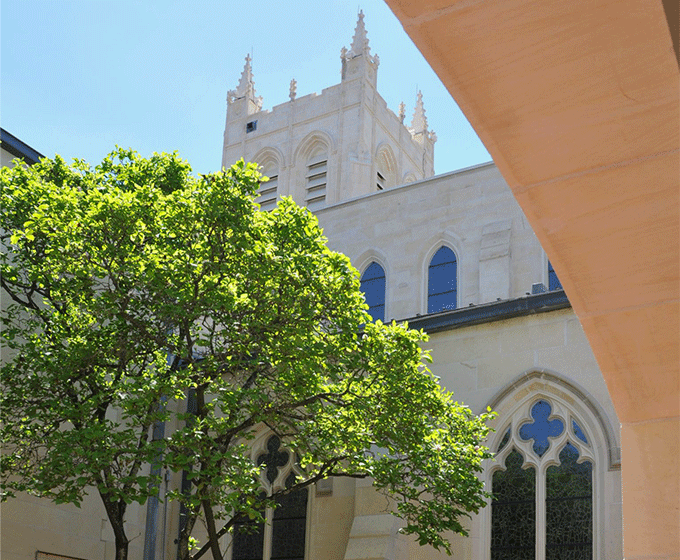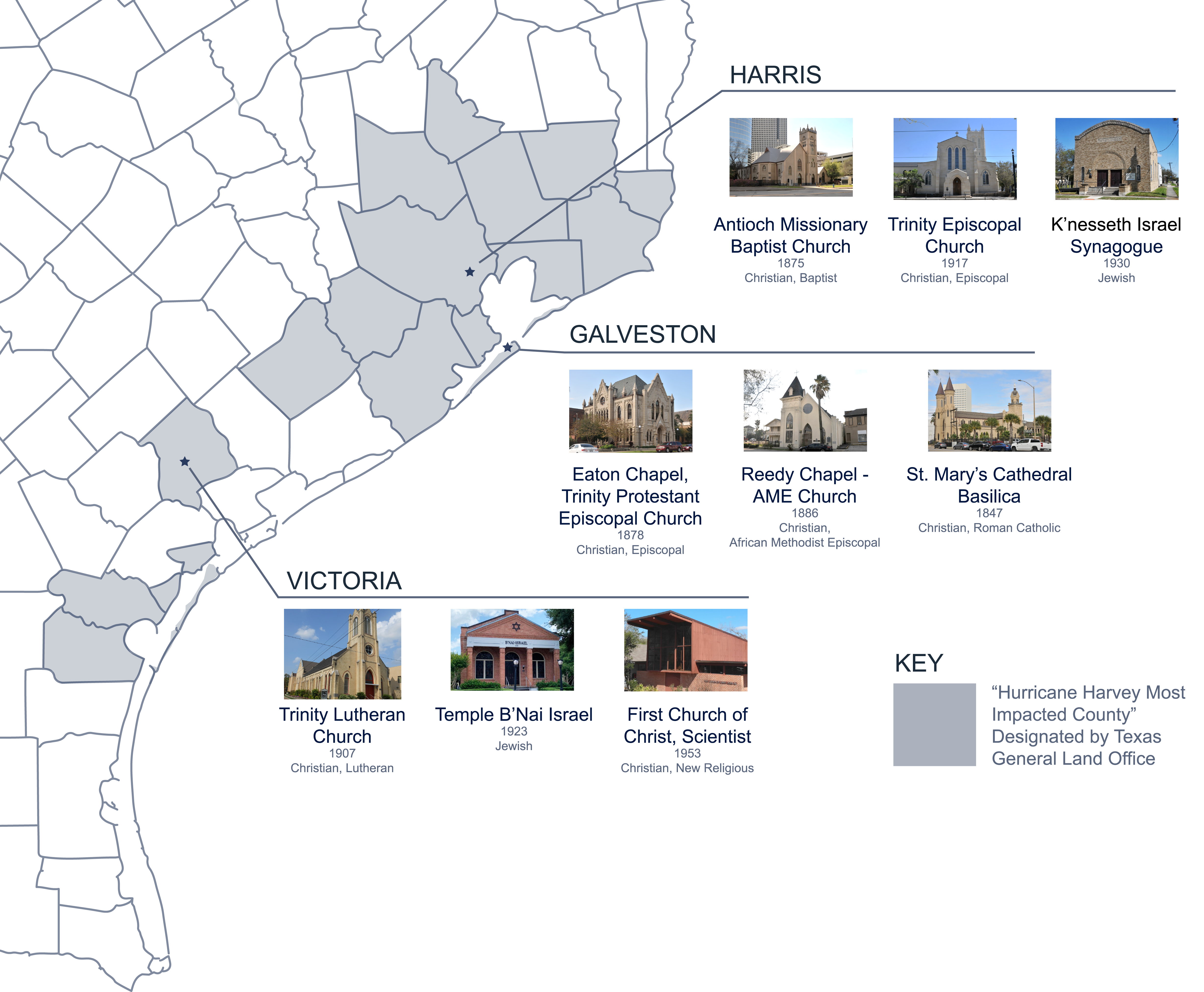
Trinity Episcopal in Houston is one nine historic houses of worship UTSA’s Center for Cultural Sustainability is helping protect from future hurricanes.
OCTOBER 3, 2022 — For historical sites analyzed by a group of UTSA researchers, hurricanes are no match.
Two years ago, the UTSA Center for Cultural Sustainability embarked on a project to improve the disaster resilience of historic buildings along the Texas Gulf Coast. The researchers are now close to completion of a Resilience Roadmap, a step-by-step guide that will help preserve the structural integrity of these properties against hazardous weather events.
The group created an action plan that includes an assessment called a Resilience Performance Indicator or RPI. It’s a specifically designed numeric scoring system to help the keepers of these historic properties fortify their structures against hurricane damage. Additional tools developed by the UTSA team include treatment strategies for individual building components, such as doors, windows, foundations and roofs.
 These nine religious facilities along the Gulf Coast are part of the Resilience Roadmap case study.
These nine religious facilities along the Gulf Coast are part of the Resilience Roadmap case study.Nine religious facilities throughout Galveston, Harris and Victoria counties that had previously sustained hurricane damage were chosen for the case study. They are all either on the National Register of Historic Places or eligible to be. The properties also provide service to their communities beyond religious needs. With experts anticipating weather to grow more severe in the coming years, historical buildings face a unique challenge: how to improve a structure’s ability to withstand disaster while maintaining its historic character.
“Faith-based groups are often at the forefront in providing help during a crisis, but we need to first ensure their buildings can weather the storm,” William Dupont, Conservation Society of San Antonio Endowed Professor and director of UTSA’s Center for Cultural Sustainability, said.
The center, which is part of the Margie and Bill Klesse College of Engineering and Integrated Design, is an interdisciplinary collaboration exploring the continuity of the cultural systems of human existence. Cultural sustainability includes consideration, understanding and respect for heritage—identities and values that bind people to places.
Dupont believes it’s important to not only protect buildings for the haven they provide their communities in times of distress, but to also conserve each property for the rich history it represents.
Case studies include:
Dupont and a team of architects, engineers, and preservationists from UTSA, Eastern Michigan University, Wentworth Institute of Technology in Boston and Istanbul Technical University, along with the Philadelphia-based nonprofit Partners for Sacred Places, collaborated on the project. Funding for research was provided by emergency supplemental funding from the Historic Preservation Fund, administered by the National Park Service, U.S. Department of the Interior, and the Texas Historical Commission.
The RPI was developed by the UTSA team after a six-month data collection process that involved making field visits to each of the nine locations. Using their collective expertise, the researchers carefully examined each building and made notes of any issues such as cracks or leaky roofs. The team used a thermal camera to measure heat from the walls and collected and analyzed soil samples. A structural analysis took place using SAP2000 software to gauge how well each building would perform in high winds and/or extensive flooding.
Results of UTSA research will be shared among the case studies and other faith-based groups and serve as a model for similar disaster and resilience planning efforts across the nation.
“Our goal is for this research to be used and help establish a network focusing on historic preservation against the harsh realities of the environment. It’s important to keep these buildings alive,” Dupont said.
UTSA is a Tier One research university and a Hispanic Serving Institution specializing in cyber, health, fundamental futures, and social-economic transformation. UTSA aspires to become a model for student success, a great public research university, and an exemplar for strategic growth and innovative excellence.
UTSA Today is produced by University Communications and Marketing, the official news source of The University of Texas at San Antonio. Send your feedback to news@utsa.edu. Keep up-to-date on UTSA news by visiting UTSA Today. Connect with UTSA online at Facebook, Twitter, Youtube and Instagram.
Move In To COLFA is strongly recommended for new students in COLFA. It gives you the chance to learn about the Student Success Center, campus resources and meet new friends!
Academic Classroom: Lecture Hall (MH 2.01.10,) McKinney Humanities BldgWe invite you to join us for Birds Up! Downtown, an exciting welcome back event designed to connect students with the different departments at the Downtown Campus. Students will have the opportunity to learn about some of the departments on campus, gain access to different resources, and collect some giveaways!
Bill Miller PlazaCome and celebrate this year's homecoming at the Downtown Campus with food, games, giveaways, music, and more. We look forward to seeing your Roadrunner Spirit!
Bill Miller PlazaThe University of Texas at San Antonio is dedicated to the advancement of knowledge through research and discovery, teaching and learning, community engagement and public service. As an institution of access and excellence, UTSA embraces multicultural traditions and serves as a center for intellectual and creative resources as well as a catalyst for socioeconomic development and the commercialization of intellectual property - for Texas, the nation and the world.
To be a premier public research university, providing access to educational excellence and preparing citizen leaders for the global environment.
We encourage an environment of dialogue and discovery, where integrity, excellence, respect, collaboration and innovation are fostered.